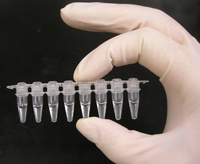
Photo from wikipedia
A genetic algorithm (GA) combines the restriction enzyme mining core of single nucleotide polymorphism (SNP) restriction fragment length polymorphism (RFLP) to design polymerase chain reaction (PCR)-RFLP primer pairs for SNP-based… Click to show full abstract
A genetic algorithm (GA) combines the restriction enzyme mining core of single nucleotide polymorphism (SNP) restriction fragment length polymorphism (RFLP) to design polymerase chain reaction (PCR)-RFLP primer pairs for SNP-based genotyping with feasible estimated GA parameters. However, this GA method is easily trapped into local optima. An improved design of PCR-RFLP assay primers for SNP genotyping is needed. A memetic algorithm (MA) was used to design more robust primers for the PCR-RFLP assay to enable SNP genotyping. The novel restriction enzymes hunting (REHUNT) package was embedded into the MA method to provide available restriction enzymes. A formula to calculate more accurate thermodynamic primer melting temperatures was also introduced. Using the criteria of the GA method, in silico simulations for the MA method under different parameter settings were performed with the SNPs of SLC6A4, and results were compared. Appropriate MA parameter settings were superior in providing robust PCR-RFLP primers to achieve SNP genotyping compared with the GA method. Improvements included an accurate thermodynamic SantaLucia’s formula for the calculation of melting temperature, use of the novel REHUNT for restriction enzymes mining, and selection of primers that better conformed to the primer constraints. The appropriate parameter settings for the proposed MA method were identified and carefully evaluated to design robust PCR-RFLP primers for SNP genotyping. Compared with the former GA method, the MA method is more feasible for PCR-RFLP SNP genotyping.
Journal Title: IEEE Access
Year Published: 2018
Link to full text (if available)
Share on Social Media: Sign Up to like & get
recommendations!